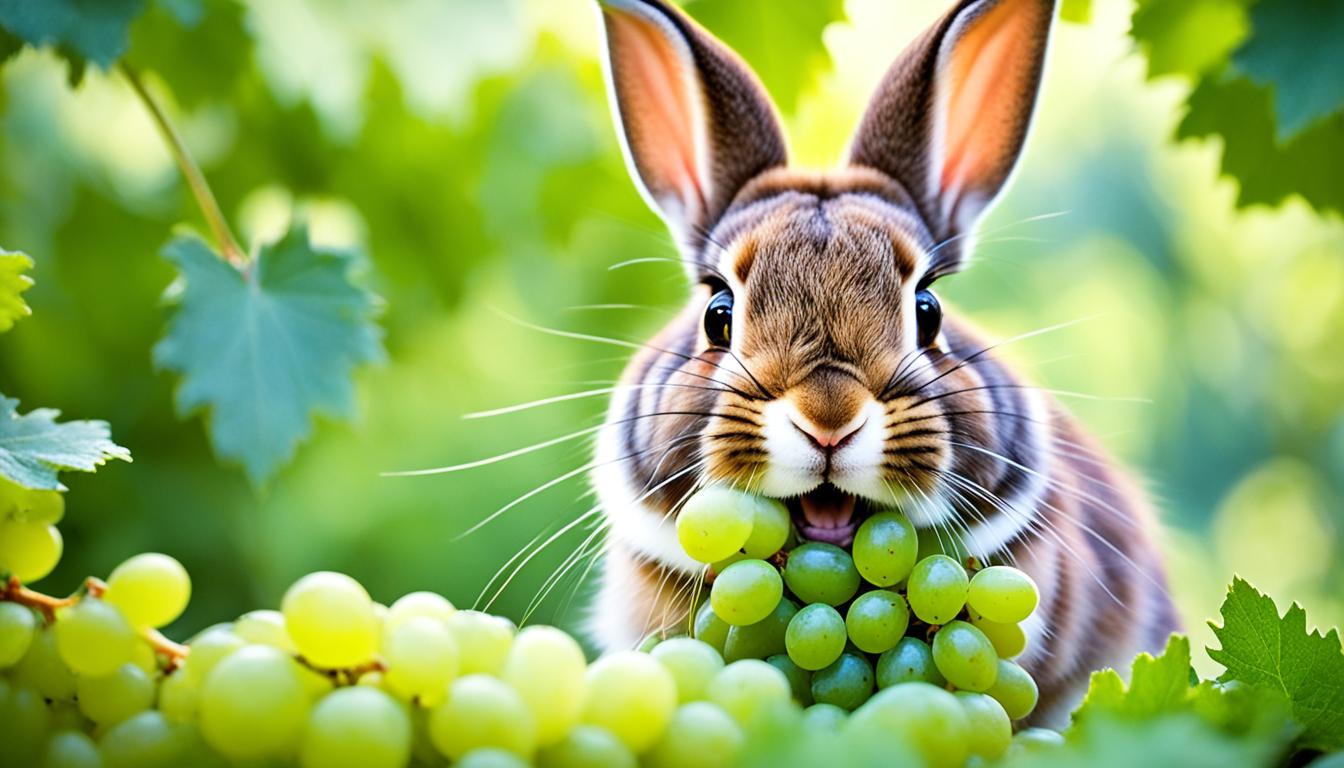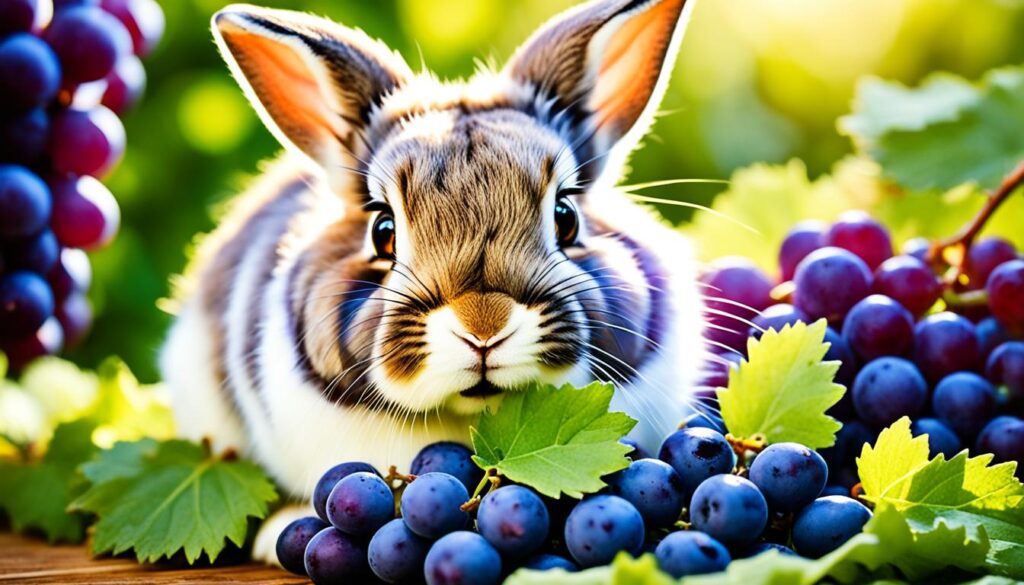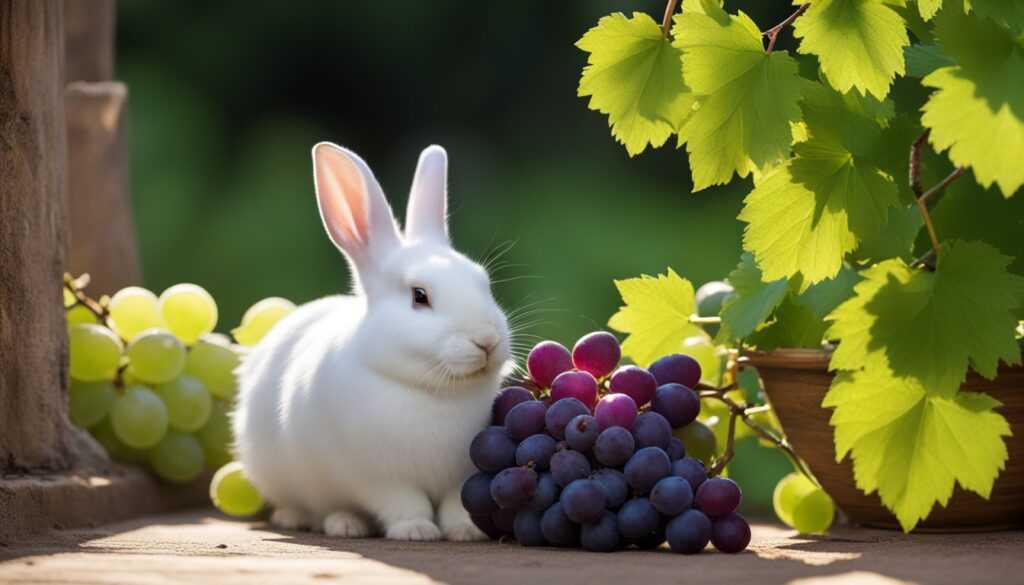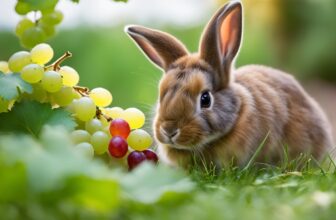Can Bunnys Eat Grapes? A Guide for Rabbit Owners

As a rabbit owner, you may have wondered if it’s safe to feed your furry friend some of the fresh, juicy grapes you enjoy. After all, grapes are a popular treat for many pets, but are they truly suitable for bunnies? This comprehensive guide will explore the benefits, risks, and proper ways to incorporate grapes into your rabbit’s diet, empowering you to make informed decisions about your pet’s nutrition.
Key Takeaways
- Grapes can be a safe and nutritious treat for rabbits when fed in moderation.
- Rabbits should not consume more than 2-3 grapes per day, 2-3 times a week, to avoid digestive issues.
- Seedless grapes are recommended to prevent choking hazards and blockages.
- Grape intake should be limited in baby rabbits until their digestive system is more mature.
- Rabbits require a diet primarily consisting of hay, grass, and leafy greens, with grapes and other fruits as occasional treats.
Understanding a Rabbit’s Diet
Rabbits are herbivores, meaning their diet should primarily consist of plant-based foods. Maintaining a balanced bunny diet is crucial for their overall health and well-being. At the heart of a rabbit’s diet is hay, which should make up approximately 80% of their daily intake.
The Importance of Hay
Hay is the foundation of a healthy rabbit diet. It provides essential fiber that helps with proper digestion and prevents gastrointestinal issues. Timothy hay or orchard grass hay are excellent options, as they are high in fiber and low in protein and calcium. Providing a constant supply of fresh, high-quality hay is vital for your rabbit’s well-being.
Leafy Greens and Vegetables
In addition to hay, leafy greens and other vegetables should make up about 10% of a rabbit’s diet. These nutrient-dense foods can provide a variety of vitamins, minerals, and additional fiber. Introduce new greens and veggies slowly, monitoring your rabbit’s digestive health. Some great options include kale, spinach, bell peppers, and carrots.
Maintaining a balanced diet with the right proportion of hay, leafy greens, and vegetables is essential for a rabbit’s overall health and well-being. By understanding the nutritional needs of your furry companion, you can ensure they thrive and enjoy a long, happy life.
“Providing the right balance of hay, greens, and occasional treats is essential for maintaining a healthy rabbit.”
Can Bunnys Eat Grapes?
Rabbits, the beloved companions of many pet owners, are often curious about the foods they can enjoy. When it comes to the popular fruit, grapes, the answer is a cautious yes – adult rabbits can consume small amounts of grapes as an occasional treat. However, it’s crucial to understand the potential risks and feeding guidelines to ensure your bunny’s health and wellbeing.
Grapes are not a staple food in a rabbit’s diet, but they can be offered in moderation. The natural sugars found in grapes can potentially cause digestive issues if consumed in excess. Rabbits are obligate herbivores, meaning their bodies are designed to thrive on a diet rich in hay, leafy greens, and a limited amount of other vegetables and fruits.
According to recent studies, the average domestic rabbit spends around 60 minutes per day eating, grazing similar to cows and sheep. Their diet should consist primarily of fresh grass or hay, which should make up the majority of their intake. Leafy greens, fruits, and vegetables should account for around 10% of their diet, while fiber-rich pellets should make up no more than 5%.
When it comes to feeding grapes to rabbits, the key is to do so in small portions and infrequently. The recommended serving size is one large grape or two small grapes, and they should be offered only a couple of times per week. Excessive consumption of grapes can lead to gastrointestinal issues, so it’s crucial to monitor your rabbit’s reaction and adjust the portion size accordingly.
It’s also important to note that baby rabbits should not be given grapes at all, as their delicate digestive systems may not be able to handle the natural sugars found in the fruit. As your rabbit matures, you can gradually introduce grapes as an occasional treat, but always in moderation.
In conclusion, while can rabbits eat grapes, the answer is a qualified yes. Grapes can be a safe and enjoyable treat for adult rabbits, but they should be fed sparingly and with caution. As with any new food, it’s always best to consult with your veterinarian to ensure your rabbit’s dietary needs are being met and to avoid any potential health concerns.
Benefits of Grapes for Rabbits
While grapes are not a staple part of a rabbit’s diet, they can provide some beneficial nutrients when fed in moderation. Grapes contain essential vitamins, minerals, and antioxidants that can offer health advantages for your furry friend.
Nutritional Value
Grapes are a good source of vitamins C and K, as well as potassium, manganese, and fiber. These nutrients can support a rabbit’s overall health and well-being. Additionally, the antioxidants found in grapes, such as resveratrol and flavonoids, can help combat oxidative stress and inflammation.
Entertaining Treat
Beyond the nutritional benefits, grapes can also serve as an enjoyable and enriching treat for rabbits. The texture and sweetness of grapes can provide a stimulating sensory experience, making them an entertaining addition to a rabbit’s diet when used in moderation.
However, it’s important to remember that grapes are high in sugar content, which can lead to digestive issues for rabbits if consumed in excess. Moderation is key when feeding grapes to bunnies, and they should be given only as an occasional snack, not as a regular part of their diet.
| Nutrient | Amount in Grapes | Potential Benefits for Rabbits |
|---|---|---|
| Vitamin C | 3.7 mg per 100g | Supports immune function and skin health |
| Vitamin K | 14.6 μg per 100g | Promotes blood clotting and bone health |
| Potassium | 191 mg per 100g | Maintains fluid balance and muscle function |
| Manganese | 0.24 mg per 100g | Supports metabolism and antioxidant defenses |
| Fiber | 0.9 g per 100g | Promotes healthy digestion and gut function |

While grapes can be a nutritious and entertaining treat for rabbits, it’s crucial to feed them in moderation to avoid potential digestive issues or health problems. By understanding the benefits and precautions, rabbit owners can safely incorporate grapes into their bunnies’ diets as an occasional special snack.
Feeding Grapes to Rabbits: Guidelines and Precautions
When incorporating grapes into your rabbit’s diet, it’s important to practice portion control. Grapes are a treat that should be fed in moderation, as they are high in natural sugar and can potentially upset a rabbit’s sensitive digestive system. The appropriate amount for rabbits to consume would be around four or five grapes per week.
Portion Control
Limit grapes to 2-3 per day, no more than 2-3 times per week, for an adult rabbit. Overindulgence in grapes can lead to issues like upset stomach, gas accumulation, bloating, and pH level changes in the rabbit’s stomach. It’s crucial to wash grapes thoroughly before feeding them to rabbits, as commercial grapes are known to contain significant pesticide residue.
Baby Rabbits and Grapes
Avoid feeding grapes to baby rabbits under 12 weeks old, as their digestive systems are still developing. Grapes, with their high sugar content, can be difficult for young bunnies to digest properly. Additionally, grape seeds can pose a choking hazard, so it’s best to feed seedless grapes. Monitor your rabbit for any digestive issues, such as diarrhea or bloating, when introducing grapes or any new food to their diet.
Remember, grapes should be considered a treat and not a dietary staple for rabbits. Hay, fresh greens, and vegetables should make up the majority of a rabbit’s daily intake to ensure they maintain a healthy, balanced diet.

Safe Fruits and Veggies for Rabbits
As rabbit owners, it’s important to provide our furry friends with a balanced and nutritious diet. In addition to the well-known benefits of grapes, there are several other safe fruits and vegetables that can be incorporated into a rabbit’s mealtime routine.
Some of the safe foods for rabbits include:
- Apples (without seeds)
- Melons
- Pears
- Peaches
- Plums
- Bananas (in moderation)
- Leafy greens like romaine lettuce, spring mix, and dandelion greens
When introducing new fruits and veggies for bunnies, it’s crucial to do so gradually and monitor your rabbit’s reaction. This ensures their digestive system can properly tolerate the new item. Additionally, it’s recommended to limit the portion size of high-sugar fruits to prevent any potential gastrointestinal issues.
Alongside these healthy rabbit snacks, a balanced rabbit diet should consist primarily of fresh hay, such as timothy hay or orchard grass, which should make up approximately 80% of their daily intake. Leafy greens and vegetables should make up around 10% of the diet, with the remaining portion coming from a high-quality rabbit pellet.
“A varied and nutrient-rich diet is essential for a rabbit’s overall health and well-being.”
By providing your rabbit with a diverse array of safe fruits and veggies, you can ensure they receive the necessary vitamins, minerals, and fiber to thrive. Remember to always consult with your veterinarian for personalized guidance on your rabbit’s dietary needs.
Conclusion
In conclusion, grapes can be a healthy and entertaining treat for adult rabbits when incorporated into their diet in moderation. Grapes provide rabbits with valuable nutrients, such as vitamins, minerals, and antioxidants, that can contribute to their overall well-being. However, it’s crucial to be mindful of portion sizes and to avoid feeding grapes to young rabbits under 12 weeks old, as their digestive systems are still developing.
By understanding the benefits and precautions of feeding grapes to your rabbit, you can safely and responsibly incorporate this fruit into your bunny’s routine. Remember, a balanced diet for rabbits should consist primarily of hay, with leafy greens and vegetables making up the majority of their daily intake. Fruits and treats, like grapes, should be offered in moderation as an occasional treat.
Key takeaways for feeding grapes to rabbits include: moderation is key, avoid grapes for young rabbits, and always prioritize a hay-based diet. By following these guidelines, you can ensure your rabbit enjoys the delicious and nutritious benefits of grapes while maintaining a healthy and happy lifestyle.







